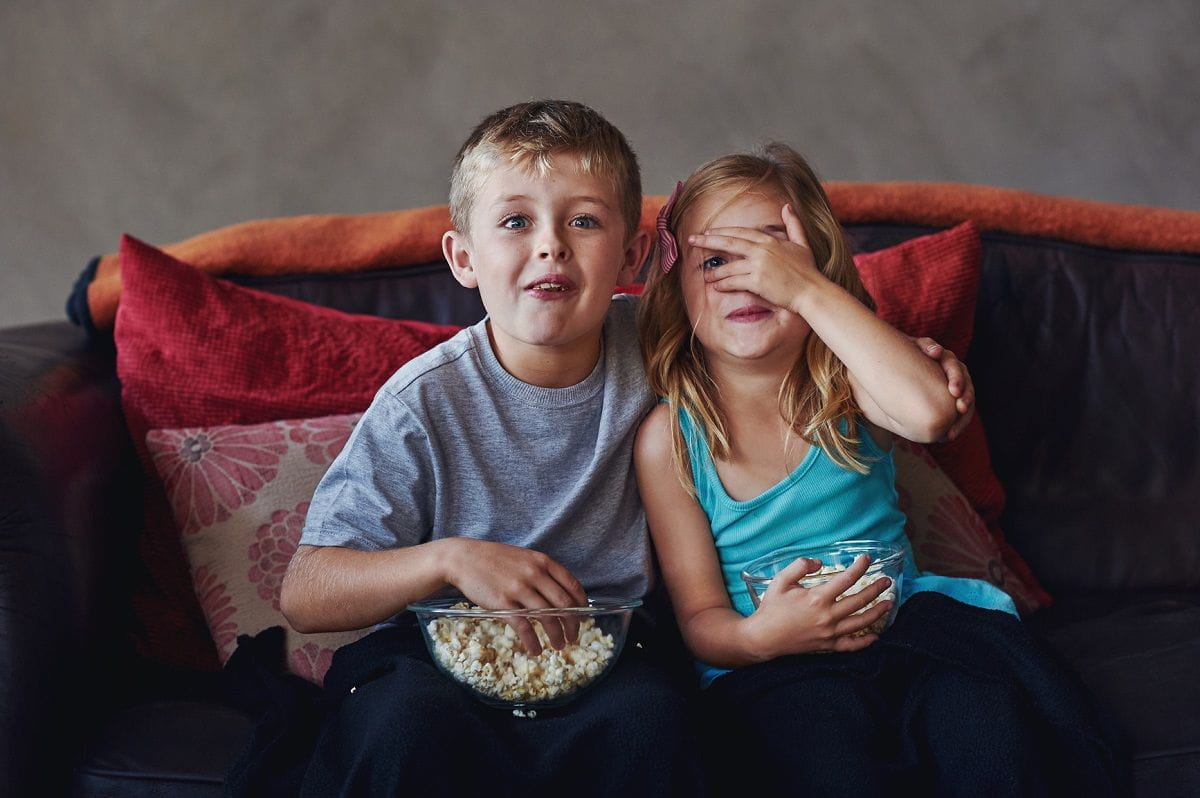TOO SCARY! Why Some Kids Are Afraid of Everything in Movies

By Cheryl Flanders
Have you noticed that even movies billed as kid flicks have some pretty scary moments? The flying monkeys carry off characters in The Wizard of Oz, Bambi loses his home to a fire and his mother is killed by a hunter, Frozen features a territorial ice monster, and Moana includes a fiery monster bent on hunting her down.
Whether the hero is being chased by a vengeful villain or a heroine’s parents die during a storm at sea, these plot lines can have a powerful effect on many young children, who may still be working to distinguish fiction life from real life. When these empathetic souls watch a film, even a cartoon, they view the movie’s story like it’s their own, and this can bring up childhood anxieties and fears: What if I were hunted down by a monster made of lava? What if I were separated from my parents?
Understandably, for these children, movies are just no fun to watch. In fact, they’re pretty stressful. So why on earth do kids’ movies feature this kind of scary content? Well, good versus evil is a plot line as old as time, for one. And evil isn’t all bad. According to the Children’s Media Foundation, being exposed to mildly frightening content lays a foundation for understanding that bad things can happen in life—and as they grow older, children will be ready for more adult content.
Whatever the reason, every child is different—some will be terrified, while others may barely bat an eyelid. While this can be partially attributed to temperament, Margee Kerr, a sociologist who studies fear, thinks there’s also a physical cause that’s entirely dependent on individual brain chemistry: “One of the main hormones released [when we’re scared] is dopamine, and it turns out some individuals may get more of a kick from this dopamine response than others do,” she notes in The Atlantic.
Dopamine is a chemical released by the brain that makes us feel good—so in other words, kids who have more of a dopamine rush are less likely to be overwhelmed by scary plot points.
Age is also a contributing factor. Kids between the ages of five and eight are still learning how to discern between fantasy and reality, and in movies, that line can become blurred for them. Children in this age range are especially prone to feeling anxious or uncomfortable if the story is too intense.
Here are some tips to help you navigate the sometimes-frightening waters of kids’ movies:
1. Do a Little Research About the Kids’ Movie First
Do your homework before heading to the theater by checking out Common Sense Media, which hosts a large library of children’s movie reviews, ratings, and summaries to help parents make smart media choices.
2. Avoid 3-D Movies for Younger Children
It’s true, 3-D makes the whole movie-watching experience much more real—but for children under the age of five, who are still learning what’s real and what isn’t, 3-D can turn into a frightening sensory overload.
3. Talk Through Scary Plot Twists Before They Happen
As you watch a movie together, let them know when something difficult is going to happen and then talk about it. Don’t worry about spoiling the movie—in case you forgot, young children love to watch movies over and over again.
4. Recognize Their Childhood Fears and Respect Them
If your child has a recurring nightmare, specific fears, or has experienced something that’s disturbed or saddened them, show consideration for their sensitivity and avoid movies with those themes, for now. For example, if your child has experienced the death of a pet, shelve Marley & Me and Charlotte’s Web for later. In time, they’ll be ready for them, and you can even have a pre-movie discussion to help them process this circle-of-life experience. But no need to rush—let them get there in their own time.
5. Validate Their Experiences
Avoid saying things like, “It’s not that scary, just watch it!” or even “Be brave!” Kids can assume from these kinds of phrases that their feelings aren’t okay, or that there’s something wrong with their reaction—and that can make their confidence drop quick. Acknowledging their point of view and offering a quick fix (“You’re right, that was a little scary. We can turn it off and come back to it later if you want!”) lets them know you’re on their side.





